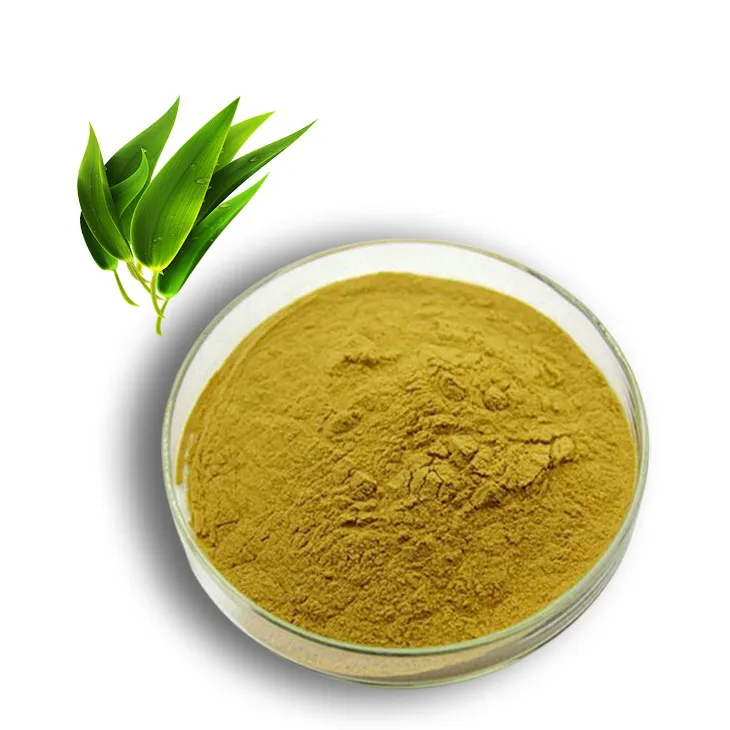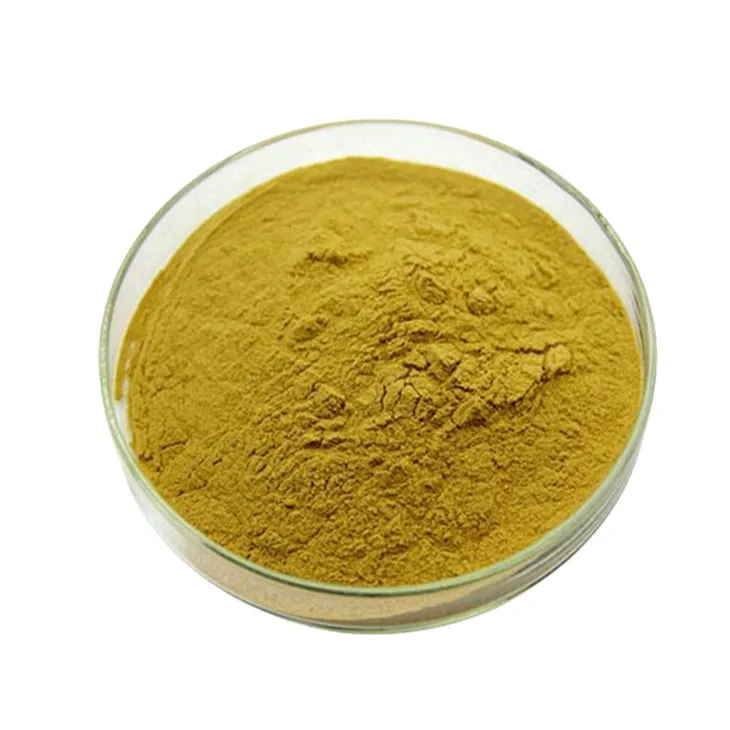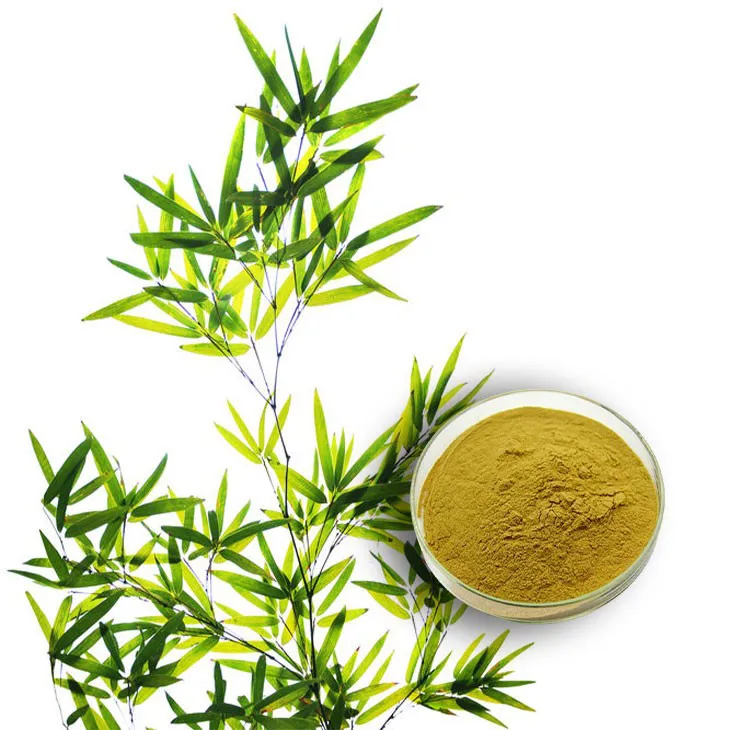- 0086-571-85302990
- sales@greenskybio.com
Use bamboo leaf extract? Make sure you source from sustainable suppliers!
2024-12-14

1. Introduction
Bamboo Leaf extract has emerged as a valuable ingredient in a variety of industries. It is used in the food and beverage sector for its potential health benefits, in the cosmetic industry for its antioxidant properties, and in the pharmaceutical field for its medicinal potential. As the demand for Bamboo Leaf extract continues to grow, it is of utmost importance to ensure that the source of this extract is sustainable.

2. The Significance of Sourcing from Sustainable Suppliers
2.1 Environmental Protection
Bamboo is a highly sustainable plant in many ways. However, improper harvesting can have negative environmental impacts. Sustainable suppliers follow practices that protect the environment. For instance, they ensure that bamboo is harvested in a way that does not damage the surrounding ecosystem. Bamboo forests are home to a diverse range of flora and fauna. If the extraction of bamboo leaves is not done sustainably, it can disrupt the habitats of these species. Sustainable suppliers limit their harvesting to levels that allow the bamboo forest to regenerate naturally. They also avoid the use of harmful pesticides and fertilizers that could contaminate the soil and water sources in the area.
2.2 Support for Local Communities
When sourcing from sustainable suppliers, it often means supporting local communities. Many bamboo - growing regions are home to small - scale farmers and communities. These suppliers typically provide fair wages and working conditions for the local workers involved in the harvesting and processing of bamboo leaves. This economic support helps to boost the local economy, improve living standards, and reduce poverty in these areas. For example, in some rural areas, the income from bamboo leaf harvesting and extraction has become a significant source of livelihood for families. By choosing sustainable suppliers, companies are contributing to the long - term development of these communities.
2.3 Guarantee of Extract Quality
Sustainable suppliers are more likely to have strict quality control measures in place. They understand the importance of maintaining the purity and potency of the Bamboo Leaf extract. Since they are committed to sustainable practices, they are also more likely to follow good agricultural and manufacturing practices. This includes proper handling of the raw materials, clean processing facilities, and adherence to safety and quality standards. High - quality bamboo leaf extract is essential for industries relying on its properties, such as the food and pharmaceutical industries, where product safety and effectiveness are crucial.

3. How to Identify Sustainable Suppliers
3.1 Certification and Standards
One of the key ways to identify sustainable suppliers is through certifications. There are several recognized certifications in the field of sustainable agriculture and forestry. For example, Forest Stewardship Council (FSC) certification indicates that the bamboo is sourced from well - managed forests. Suppliers with FSC certification have to meet strict environmental, social, and economic criteria. Another important certification could be related to organic farming. If the bamboo is grown organically, it means that no synthetic pesticides or fertilizers are used, which is not only better for the environment but also for the quality of the extract. Look for suppliers who can provide evidence of these certifications.
3.2 Transparency in the Supply Chain
A sustainable supplier should be transparent about their supply chain. This means they should be able to provide information on where the bamboo is sourced from, how it is harvested, and the processing methods used. Transparency allows companies using the bamboo leaf extract to trace the origin of the product and ensure that it meets their sustainability requirements. Suppliers should be willing to share details such as the location of the bamboo forests, the names of the farmers or cooperatives involved, and any third - party audits or inspections that have been carried out on their operations.
3.3 Environmental and Social Policies
Review the environmental and social policies of potential suppliers. A sustainable supplier will have clear policies in place to protect the environment, such as measures to reduce waste, conserve water, and protect biodiversity. Socially, they should have policies regarding fair labor practices, including equal pay for equal work, safe working conditions, and no child labor. These policies should not just be on paper but actually implemented in their day - to - day operations. For example, they could have training programs for their workers on sustainable harvesting techniques and environmental protection.

4. Challenges in Sourcing from Sustainable Suppliers
4.1 Limited Availability
Currently, the number of fully sustainable suppliers may be limited compared to the overall demand for bamboo leaf extract. This can make it challenging for companies to source exclusively from sustainable sources. Some regions may not have well - developed sustainable bamboo cultivation and extraction operations yet. As a result, companies may need to invest more time and resources in finding suitable sustainable suppliers or may need to work with suppliers to help them improve their sustainability practices.
4.2 Cost Considerations
In some cases, products sourced from sustainable suppliers may be more expensive. Sustainable practices often require additional investment in areas such as environmental protection, fair labor, and quality control. For companies operating on tight budgets, this can be a significant deterrent. However, it is important to consider the long - term benefits. While the initial cost may be higher, the quality and sustainability aspects can lead to a better reputation, reduced environmental risks, and potentially more stable supply in the long run.

5. Conclusion
In conclusion, as the use of bamboo leaf extract becomes more widespread, sourcing from sustainable suppliers is not only a responsible choice but also a strategic one. It offers numerous benefits in terms of environmental protection, support for local communities, and guarantee of extract quality. Although there are challenges in identifying and sourcing from sustainable suppliers, the long - term advantages far outweigh the short - term difficulties. Companies should be proactive in seeking out sustainable suppliers, using tools such as certifications, transparency checks, and policy reviews to ensure that they are making a sustainable choice for their bamboo leaf extract sourcing.
FAQ:
What are the benefits of sourcing bamboo leaf extract from sustainable suppliers?
Sourcing bamboo leaf extract from sustainable suppliers has multiple benefits. Firstly, it ensures environmental protection. Sustainable suppliers are more likely to use eco - friendly harvesting methods, which helps maintain the ecological balance of bamboo forests. Secondly, it supports local communities. They often engage local workers and contribute to the local economy. Thirdly, it guarantees the quality of the extract. Sustainable practices usually involve proper handling and processing, which results in a higher - quality product.
How can one identify sustainable suppliers of bamboo leaf extract?
There are several ways to identify sustainable suppliers of bamboo leaf extract. One can look for certifications such as Forest Stewardship Council (FSC) certification, which indicates that the bamboo is sourced sustainably. Researching the supplier's reputation in the industry, including customer reviews and testimonials, can also be helpful. Additionally, inquiring about their sourcing and production processes, such as whether they use sustainable harvesting techniques and have proper waste management, is important.
Why is environmental protection important when sourcing bamboo leaf extract?
Environmental protection is crucial when sourcing bamboo leaf extract because bamboo forests play a significant role in the ecosystem. Bamboo helps prevent soil erosion, provides habitat for wildlife, and contributes to carbon sequestration. Unsustainable sourcing methods can lead to deforestation, disruption of local ecosystems, and a negative impact on biodiversity. By protecting the environment during the sourcing process, we can ensure the long - term availability of bamboo and the health of the surrounding ecosystem.
How does sourcing from sustainable suppliers support local communities?
When we source bamboo leaf extract from sustainable suppliers, it often supports local communities in several ways. Sustainable suppliers may hire local workers for harvesting, processing, and other related jobs, providing employment opportunities. This, in turn, helps to boost the local economy. They may also invest in local infrastructure or support community development projects. Additionally, by promoting sustainable practices, they can help preserve the local environment, which is essential for the well - being of the community.
What are the potential risks of sourcing bamboo leaf extract from non - sustainable suppliers?
The potential risks of sourcing from non - sustainable suppliers are significant. Non - sustainable suppliers may use over - harvesting methods, which can lead to the depletion of bamboo forests. This can have a negative impact on the environment, including soil degradation and loss of wildlife habitat. The quality of the extract may also be compromised as non - sustainable suppliers may not follow proper handling and processing procedures. Moreover, there could be ethical issues, such as unfair labor practices if they do not support local communities.
Related literature
- Sustainable Sourcing of Bamboo: A Review of Current Practices"
- "The Importance of Sustainable Supply Chains in the Bamboo Extract Industry"
- "Environmental and Social Impacts of Bamboo Leaf Extract Sourcing"
- ▶ Hesperidin
- ▶ citrus bioflavonoids
- ▶ plant extract
- ▶ lycopene
- ▶ Diosmin
- ▶ Grape seed extract
- ▶ Sea buckthorn Juice Powder
- ▶ Beetroot powder
- ▶ Hops Extract
- ▶ Artichoke Extract
- ▶ Reishi mushroom extract
- ▶ Astaxanthin
- ▶ Green Tea Extract
- ▶ Curcumin Extract
- ▶ Horse Chestnut Extract
- ▶ Other Problems
- ▶ Boswellia Serrata Extract
- ▶ Resveratrol Extract
- ▶ Marigold Extract
- ▶ Grape Leaf Extract
- ▶ blog3
- ▶ blog4
- ▶ blog5
-
Pure 85% Tomentil Extract.
2024-12-14
-
Konjac Powder
2024-12-14
-
Hericium erinaceus extract powder
2024-12-14
-
Quercetin
2024-12-14
-
Acai Berry Extract
2024-12-14
-
Elderberry Extract
2024-12-14
-
Hops Extract
2024-12-14
-
Buckthorn bark extract
2024-12-14
-
Pomegranate Extract
2024-12-14
-
Licorice Root Extract Powder
2024-12-14
-
Dandelion Root Extract
2024-12-14





















